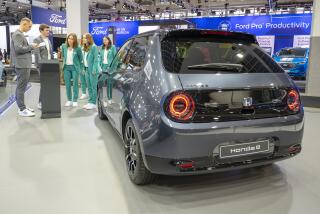Plugged-In Hybrid Tantalizes Car Buffs
- Share via
Toyota Motor Corp. boasts that its hot-selling Prius gasoline-electric hybrid doesn’t have to be plugged in.
But a growing number of hybrid buffs interested in further boosting the car’s fuel economy are asking, “Why not?”
By replacing the Prius’ batteries with a more powerful array and recharging it using a standard electric outlet at home, engineers have enabled the hybrid to get more than 100 miles per gallon of gasoline.
“We want to get people thinking of [plug-ins] as a real alternative” in the country’s long-term energy plan, said Felix Kramer, founder of CalCars.org, an advocacy group in Palo Alto.
The idea of plug-in hybrids is generating a lot of buzz in energy circles because of the work of a start-up Monrovia firm, Energy Control Systems Engineering. The firm bought a Prius and converted it with its own system.
Co-owner Greg Hanssen now tools around Southern California in the bright blue plug-in Prius prototype. The car can deliver 150 to 180 mpg for up to 35 miles of low-speed, around-town driving and can average 70 to 100 mpg on longer trips at higher speeds.
The South Coast Air Quality Management District recently gave the company $130,000 to convert four Priuses to plug-ins that will be tested in several car fleets.
In a standard Prius, a battery pack is charged by the vehicle’s own gasoline engine and with electricity produced by the brakes. The car’s all-electric mode is fairly limited because the Prius uses its gas engine except at very low speeds. Most owners get 45 to 55 mpg.
However, Energy Control Systems’ design tricks the Prius’ computer into thinking its batteries are always fully charged, so it uses the electric motor to try to drain them before switching on the gas engine.
Hanssen can drive his Prius in an all-electric mode for 35 miles at up to 35 mph. And when the gas engine does kick in, it burns far less fuel than a standard Prius because the system, with its extra batteries, has more electric power to draw on.
By babying the accelerator, Hanssen said, he can often run in electric mode on the freeway at 55 mph.
The new batteries in the prototype add 180 pounds to the vehicle’s weight, and they use up most of the storage space under the rear cargo area -- so there is no room for a spare tire.
Next year Energy Control Systems and its marketing partner, Clean-Tech of Los Angeles, hope to begin converting customers’ stock Prius hybrids to plug-ins. The initial cost will be about $12,000, Hanssen said.
There are plenty of problems to overcome, though, before plug-in hybrids show up at dealerships. Automakers worry about the extra battery weight and extra cost from the super-size batteries and express doubts that owners would bother to charge the vehicles every night.
Toyota, which expects to sell 110,000 Priuses in the United States this year, warned that an after-market conversion to a plug-in system would void its warranty. Still, Toyota spokeswoman Cindy Knight said, “We are watching [plug-in designs] with interest. It is probably within the range of solutions we would consider” eventually as an alternative power plant design.
The nascent plug-in hybrid movement is also gaining traction in Congress. This month several senators introduced the topic amid a national debate over foreign oil dependency and soaring gasoline prices. Sen. Mary Landrieu (D-La.) said high-mileage plug-ins provided “extraordinary hope” to reduce the nation’s insatiable appetite for oil.
DaimlerChrysler is also working with the Electric Power Research Institute in Palo Alto to develop a prototype plug-in hybrid version of its Sprinter delivery van.
“We are all aiming for the same goal,” Hanssen said. “We want to persuade regulators, and automakers, that plug-in hybrids will work.”
Hanssen, 38, and his partner, Pete Nortman, 48, are electrical engineers who got their start in the electric vehicle movement. Their 4-year-old firm has six employees, and Hanssen says the company pays its bills by developing electrical high-voltage management systems for various clients, including a hybrid locomotive manufacturer.
But the plug-in Prius is the firm’s principal claim to fame.
In May, Energy Control Systems entered its Prius in the Tour del Sol fuel economy rally in New York. The car won its class by averaging 102 mpg over the 150-mile course. Hanssen said it cost $1 to charge the batteries the night before the race and about $4 for the gas it consumed.
If hybrid makers added plug-in, Hanssen said, mass production could get the extra cost down to about $3,000 over that of a regular hybrid model.






